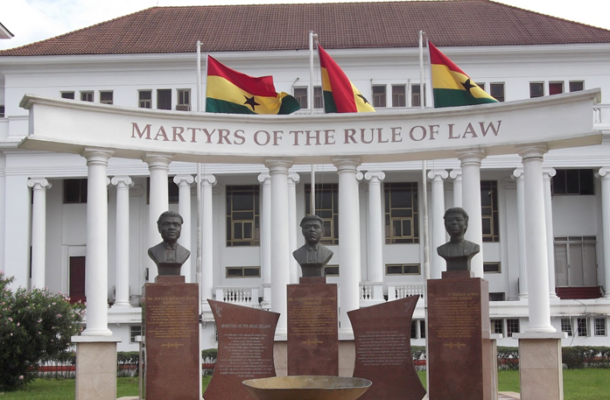A seven-member panel of the Supreme Court unanimously dismissed a suit challenging the constitutionality of Section 104 (1) (b) of the Criminal Offenc
A seven-member panel of the Supreme Court unanimously dismissed a suit challenging the constitutionality of Section 104 (1) (b) of the Criminal Offences Act, 1960 (Act 29).
This section criminalizes sexual intercourse in an unnatural manner, even between consenting adults, including the use of sex toys.
The Supreme Court on Wednesday, July 24, 2024, upheld that the existing law, which makes it unlawful for both heterosexuals and homosexuals to engage in anal sex, does not breach the 1992 Constitution, graphic.com.gh reports.
Pursuant to Section 104 (1) (b) of Act 29, any person aged 16 years and above who has unnatural carnal knowledge with another person, even with consent, commits a misdemeanor punishable by up to three years in prison.
The suit was initiated by Dr. Prince Obiri-Korang, a law lecturer at the University of Ghana.
He argued that Section 104 (1) (b) of Act 29 violated Article 14 (1) of the 1992 Constitution by depriving individuals of the liberty to choose their intimate sexual partners and engage in sexual conduct without state interference.
Dr. Obiri-Korang sought a declaration from the Supreme Court that Section 104 (1) (b) of Act 29 was unconstitutional.
However, the court, presided over by Justice Paul Baffoe-Bonnie, ruled that the suit had no merit and dismissed it.
“There is no merit in the action. In the circumstances, the whole action fails and same is dismissed,” the court held.
The court will deposit the full reasoning behind its decision at the Court’s Registry within 10 days.
Other members of the panel included Justices Avril Lovelace Johnson, Issifu Omoro Tanko Amadu, Emmanuel Yonny Kulendi, Ernest Gaewu, Yaw Darko Asare, and Richard Adjei-Frimpong.
Section 104 of Act 29 is divided into three parts. Section 104 (1) (a) criminalizes unnatural carnal knowledge with a person below 16 years, a first-degree felony punishable by five to 25 years in prison.
Section 104 (1) (b) makes it a misdemeanor for consenting adults to engage in unnatural carnal knowledge, the specific provision challenged by Dr. Obiri-Korang. Section 104 (1) (c) criminalizes sexual intercourse with an animal.
Unnatural carnal knowledge, as defined by Section 104 (2) of Act 29, refers to “sexual intercourse with a person in an unnatural manner or with an animal.”
Judicial interpretation in cases like Gligah & Atizo v The Republic and Banousin v The Republic has clarified that natural carnal knowledge involves the penetration of a woman’s vagina by a man’s penis.
In his suit, Dr. Obiri-Korang argued that the law’s wording could affect not only homosexuals but also females using dildos and vibrators for self-pleasure.
“The term unnatural carnal knowledge may include penetration per anum, the penetration of the female genitalia or male/female rectum with object, fellatio, and cunnilingus, all of which are not exclusive to homosexuals.”
Dr. Obiri-Korang further argued that the government’s justification for the law to protect morality was flawed, emphasizing the need to differentiate between public and private morality.
He asserted that allowing the government to dictate private morality could lead to an unjustifiable breach of individual privacy.
The Attorney General, Godfred Yeboah Dame, defended the constitutionality of Section 104 (1) (b) of Act 29, arguing that it is non-discriminatory and does not authorize privacy invasions.
“Section 104 (1) (b) of Act 29 does not authorize anyone to enter another’s bedroom to ascertain whether there has been unnatural carnal knowledge,” the AG stated in the defense, the report added.

COMMENTS